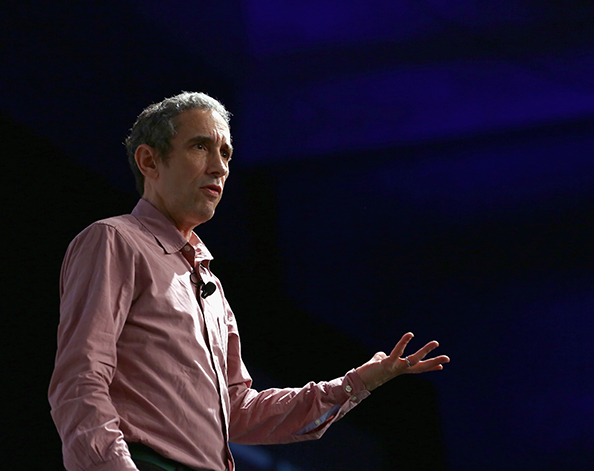Receive Focus insights straight to your inbox
Rushkoff was addressing attendees at the launch of Investec's new brand campaign, which stresses the importance of human partnerships in an increasingly complex world. His new book, Team Human is about how technology, “once a force for human connection and expression, now isolates and represses us”. In it, he invites us to remake this aspect of society in ways that “foster our humanity”.
Are humans facing an existential crisis?
“I was around when the net was born. We called it the digital renaissance because it was about the unbridled possibilities of the collective human imagination. The underlying idea was that human beings, connected as never before, could create any future that we wanted.”
Unfortunately, the ambitions that Rushkoff shared with many early adopters of the internet were never fully realised. With the dotcom boom in the late 1990s, commercial objectives supplanted the nobler ideals of greater human connectedness. "We had used all of these digital technologies to create traditional, extractive, corporate capitalism on steroids.”
Thwarting innovation and disruption
Instead of using the internet to co-create a future enriched by enhanced communication and collaboration, warns Rushkoff, digital technologies have instead begun to undermine authentic human interactions. That's in part because the companies and applications that have come to dominate the online environment are incentivised to regard human interaction as a means to profitable customer action, rather than an end in itself.
According to Rushkoff, most of the internet businesses that are popularly considered disruptive are in fact just perpetuating older modes of commerce. “Most of them are not disruptive at all. They are reactionary businesses looking to prevent the genuine disruption that a digital network would inflict upon existing hierarchies of capital.”
In their quest to deliver steady returns, the creators of businesses with the potential to truly transform society are forced to "pivot" in order to generate growth and revenue for investors. Instead of creating technologies that connect humans and enhance the world in some way, young, innovative entrepreneurs are forced to figure out how to extract money from whoever uses their platform or service, or to exploit their users' data.
“But the problem with that – the problem with moving from an anything-can-happen landscape into one that was really about providing steady returns – is that humans became valued not for their creativity, not for their ability to disrupt things, or to come up with new creative, novel, destabilising solutions, but for their utility value; for their inputs and outputs, what they could predictably reproduce.”
How to be "Team Human" in the digital future | Douglas Rushkoff
Digital landscape is anti-human
As Rushkoff sees it, the internet of today is not configured to facilitate or enhance human connections, but rather to reduce interactions into predictable outcomes that can be controlled and monetised: a human manipulation platform that negatively impacts all of us. One result is that people are having to come to terms with the dissonnance of feeling isolated in a hyper-connected world.
“We ended up with a landscape that is really anti-human and anti-social. Look what digital’s done to us, and how confused we are, and disoriented.”
To explain how we got here, Rushkoff points not to the technologies themselves, but rather to the incentives of those who programme the platforms, including social media, that have become so pervasive in our daily lives.
“Social media is not about connecting people in new ways. You know, Facebook isn’t here to help Johnny make new and more meaningful connections. Facebook is here to monetise Johnny’s social graph. It looks at what we’ve done in the past, and uses that to put us in particular statistical buckets and then do whatever is necessary to get us to behave true to those buckets. So it’s not valuing us as people, it’s valuing us as data.”
This "anti-human" agenda that has taken hold in tech companies extends across both the marketplace and workplace. In both environments the fundamental characteristics of our humanity are all-too-often regarded by these firms as obstacles to growth.
“Digital businesses hate people. If you’re looking at a digital business plan, what’s the one thing they don’t want you to have in your plan? It's humans. If you have human workers, then you’re not going to scale infinitely. They want an algorithm that could do something a billion times, rather than even five college students.”
Furthermore, digital communication channels governed by algorithms will, of necessity, lack the intrinsically human cues we’ve developed over millions of years of evolution to establish rapport, such as body language and facial expressions.

As it stands, our technology plays us, more than we play it.
Make technology more humane
So how then to make tech pro-human? Technology, in Rushkoff's view, should be utilitarian, not the humans who use it. “I don’t want technology that does something to me. I’m not concerned with how technology is treating me. I want to use technology. And it should be simple. But that’s not how we currently understand it; it’s not how we currently use it. Our technology plays us, more than we play it.”
Every time you swipe on your smartphone, for example, it learns something about you, but the user gains nothing in return. “That’s our current relationship to technology: algorithms are learning how to play us. There’s an entire department at Stanford University called Captology, which is the study of how to influence people; how to capture them through technology. They’re using Pavlovian and Freudian cues, and they’re taking the algorithms from slot machines and putting them into our social media feeds and into our internet trading platforms.”
This creates the illusion of user control, said Rushkoff. “And, as we've learnt from behavioural economics in finance, the more news and information people think they have about the market, the stupider the things they do. So the more advanced your trading platform, if you’re a consumer, the worse you actually do in the stock market, and that’s because these are really toys. So we use behavioural economics and big data, really just to manipulate people, instead of to understand people and serve their actual needs.”
There’s an entire department at Stanford University called Captology, which is the study of how to influence people - how to capture them through technology.
Rushkoff believes that to address real-world needs, companies should create novel solutions that facilitate live, individualised interactions between humans. “It sounds so ridiculously simplistic, but it’s true. When you have humans talking to human beings, you come up with novel solutions.”
Regaining our humanity
Creating technologies that bring us together is hardly a new idea. Indeed, as Rushkoff reminds us, it is integral to our primal social nature, and our success as a species. “Evolution is actually a team sport. The trees share nutrients in the forest, that’s how they live – they’re not competing with one another. If human beings are the most advanced species, it’s because we’ve developed the most advanced means of communicating, of sharing and of collaborating.”
Rushkoff believes we could still leverage digital technology to reclaim our humanity. “We could develop social media that instead of making us see other people as adversaries, helps us see our adversaries as other human beings. We could create business models that aren’t about finding hockey-stick extractive and temporary growth trajectories, but instead, distribute ownership and prosperity to the workers and the communities in which they operate.”
Such a pro-human orientation would help to generate the solutions that mankind actually needs to overcome the great challenges we currently face, like climate change and inequality. But a shift of this magnitude requires a change in the way we think about business and money: "Think of money as a medium to connect people and businesses, as a circulatory system for value and prosperity, of our whole civilisation; not as a way of isolating, but as a way of exchanging and sharing value with other people; as a path towards retrieving our human connection, and, along with digital technology, a way of creating the future we actually want, together.”





